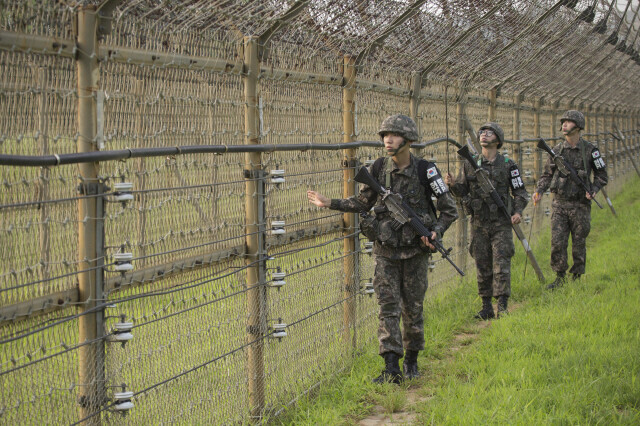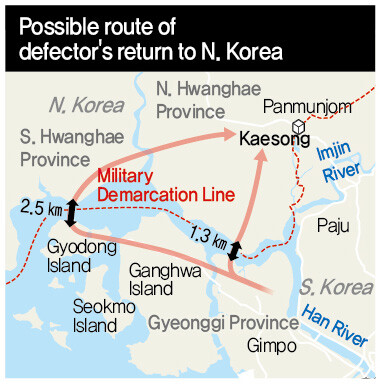hankyoreh
Links to other country sites 다른 나라 사이트 링크
N. Korea puts Kaesong on lockdown after defector showing symptoms re-crossed border

North Korea issued a public health emergency for the city of Kaesong after claiming that a North Korean defector showing signs of a COVID-19 infection had crossed back over the demarcation line into the North. South Korea’s military and government said that they were “in process of confirming” the identity of the returned defector and the method and reason for their crossing the border. It remains to be seen how the incident will impact inter-Korean relations, which are currently on ice.
“An emergency event happened in Kaesong City where a runaway who went to the South three years ago, a person who is suspected to have been infected with the vicious virus [COVID-19], returned on July 19 after illegally crossing the demarcation line,” North Korea’s state-run Korean Central News Agency (KCNA) said on Sunday.
North Korean leader Kim Jong-un responded by convening an “emergency enlarged meeting” of the Political Bureau of the Central Committee of the Workers’ Party of Korea (WPK) which announced a “shift from the state emergency anti-epidemic system to the maximum emergency system” to stop the spread of COVID-19, the KCNA reported.
“An uncertain result was made from several medical check-ups of the secretion of that person’s upper respiratory organ and blood,” the KCNA said, noting that the results suggested that the returnee might be infected with the coronavirus.
After receiving related reports on the afternoon of July 24, Kim Jong-un “took the preemptive measure of totally blocking Kaesong City and isolating each district and region from the other.” KCNA also said that Kim “declared a state of emergency in the relevant area and clarified the determination of the Party Central Committee to shift from the state emergency anti-epidemic system to the maximum emergency system and issue a top-class alert.”

The South Korean military said it was “in the process of confirming” the North Korean media’s report about a defector returning to the North. “We have assigned staff to work closely with related organizations in regard to the North Korean report,” the military said.
The military and related officials have confirmed that the returnee is a man aged 24 surnamed Kim who defected to the South in 2017.
On July 27, the South Korean Joint Chiefs of Staff announced that they’d discovered Kim’s bag, which contained water goggles, clothing, and a bank book for an account from which he’d withdrawn 5 million won (US$4,181). The bag also contained a receipt showing he’d converted 4.8 million won (US$4,013) into US dollars.
“Kim was questioned about allegations that he sexually assaulted a female friend at his house in mid-July. After receiving intelligence that he was planning to return to North Korea, we had an arrest warrant issued for sexual assault and have been tracking his location,” the police said.
Evidence has also apparently turned up that Kim recently scouted out Gyodong Island (in Gangwha County, Incheon), which is on the lower Han River, within sight of North Korea. Considering that Kim defected by swimming across the Han River to Gyodong Island in 2017, he likely returned to North Korea via the same route. Kim is likely to have swum through a drainage pipe underneath a fence that’s installed along the border in the Han River.
Kim’s return to North Korea would likely create a stir. Defectors are typically housed at a center called Hanawon for three months, where they take classes in adjusting to South Korean society; after being discharged, they receive settlement support and protection from dedicated police officers in their place of residence for about five years. Kim was also supposed to receive police protection, but observers note that, in reality, it’s not practical for police to track defectors’ every move, especially when defectors themselves don’t cooperate with what they regard as surveillance.
Military units on the front lines might also face difficult questions as well. One official in the military said that staff at the Joint Chiefs of Staff are currently assessing overall military readiness. The authorities are reportedly carrying out a careful review of video footage from surveillance equipment to determine whether the units in charge of guarding the coastline and riverside on Gyodong Island were remiss in their duties.
By Park Byong-su, senior staff writer
Please direct comments or questions to [english@hani.co.kr]

Editorial・opinion
![[Column] Season 2 of special prosecutor probe may be coming to Korea soon [Column] Season 2 of special prosecutor probe may be coming to Korea soon](https://flexible.img.hani.co.kr/flexible/normal/500/300/imgdb/original/2024/0426/3317141030699447.jpg) [Column] Season 2 of special prosecutor probe may be coming to Korea soon
[Column] Season 2 of special prosecutor probe may be coming to Korea soon![[Column] Park Geun-hye déjà vu in Yoon Suk-yeol [Column] Park Geun-hye déjà vu in Yoon Suk-yeol](https://flexible.img.hani.co.kr/flexible/normal/500/300/imgdb/original/2024/0424/651713945113788.jpg) [Column] Park Geun-hye déjà vu in Yoon Suk-yeol
[Column] Park Geun-hye déjà vu in Yoon Suk-yeol- [Editorial] New weight of N. Korea’s nuclear threats makes dialogue all the more urgent
- [Guest essay] The real reason Korea’s new right wants to dub Rhee a founding father
- [Column] ‘Choson’: Is it time we start referring to N. Korea in its own terms?
- [Editorial] Japan’s rewriting of history with Korea has gone too far
- [Column] The president’s questionable capacity for dialogue
- [Column] Are chaebol firms just pizza pies for families to divvy up as they please?
- [Column] Has Korea, too, crossed the Rubicon on China?
- [Correspondent’s column] In Japan’s alliance with US, echoes of its past alliances with UK
Most viewed articles
- 1[Column] Season 2 of special prosecutor probe may be coming to Korea soon
- 2‘We must say no’: Seoul defense chief on Korean, USFK involvement in hypothetical Taiwan crisis
- 3No good, very bad game for Korea puts it out of Olympics for first time since 1988
- 4Division commander ordered troops to enter raging flood waters before Marine died, survivor says
- 5Is Japan about to snatch control of Line messenger from Korea’s Naver?
- 6Korea’s 1.3% growth in Q1 signals ‘textbook’ return to growth, says government
- 7Is N. Korea threatening to test nukes in response to possible new US-led sanctions body?
- 8[Editorial] Korea’s surprise Q1 growth requires objective assessment, not blind fanfare
- 9[Editorial] New weight of N. Korea’s nuclear threats makes dialogue all the more urgent
- 10‘Weddingflation’ breaks the bank for Korean couples-to-be